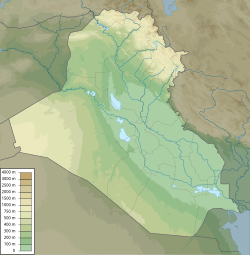
Back Baghdad ACE Багдад ADY Bagdad AF Bagdad ALS ባግዳድ AM Bagdad AN بغداد Arabic ܒܓܕܐܕ (ܡܕܝܢܬܐ) ARC بغداد ARY بغداد ARZ
Baghdad
بغداد | |
|---|---|
| Nickname: 'The City of Peace'[1] | |
| Coordinates: 33°20′N 44°23′E / 33.333°N 44.383°E | |
| Country | |
| Governorate | Baghdad |
| Established | 762 AD |
| Founded by | Abu Jafar al-Mansur |
| Government | |
| • Type | Mayor–council |
| • Body | Baghdad City Advisory Council |
| • Mayor | Zekra Alwach |
| Area | |
| • Total | 204.2 km2 (78.8 sq mi) |
| Elevation | 34 m (112 ft) |
| Population | |
| • Estimate (2016) | 8,765,000 |
| • Rank | 1st |
| Demonym | Baghdadi |
| Time zone | UTC+3 (Arabia Standard Time) |
| • Summer (DST) | No DST |
| Postal code | 10001 to 10090 |
| Website | Mayoralty of Baghdad |
Baghdad (Arabic: بغداد, transliterated Baghdād) is the capital city and largest city in Iraq. It is the second-largest city in Southwest Asia after Tehran. It is the second-largest city in the Arab world after Cairo. 5,772,000 people lived there in 2003. Baghdad is on the Tigris River at 33°20′N 44°26′E. The city was once the center of Dar al-Islam, Muslim civilization. Baghdad used to be one of the largest learning centers in the world, during the post classical era. It was one of the greatest cities of Islamic civilization. It was one of the most important cities in the Muslim world and reached its extent of art and poetry. Baghdad was founded by the Abbasid Caliphate under the Caliph Abu Jafar al-Mansur better known as simply al-Mansur. The city was captured in 1055 by the Seljuk Turks. It was largely sacked and destroyed in 1258 by the Mongol Empire of Genghis Khan. It then later came under the rule of the Safavid Iran and then the Ottoman Empire in 1537.
- ↑ Petersen, Andrew (13 September 2011). "Baghdad (Madinat al-Salam)". Islamic Arts & Architecture. Archived from the original on 16 September 2016. Retrieved 21 December 2017.

